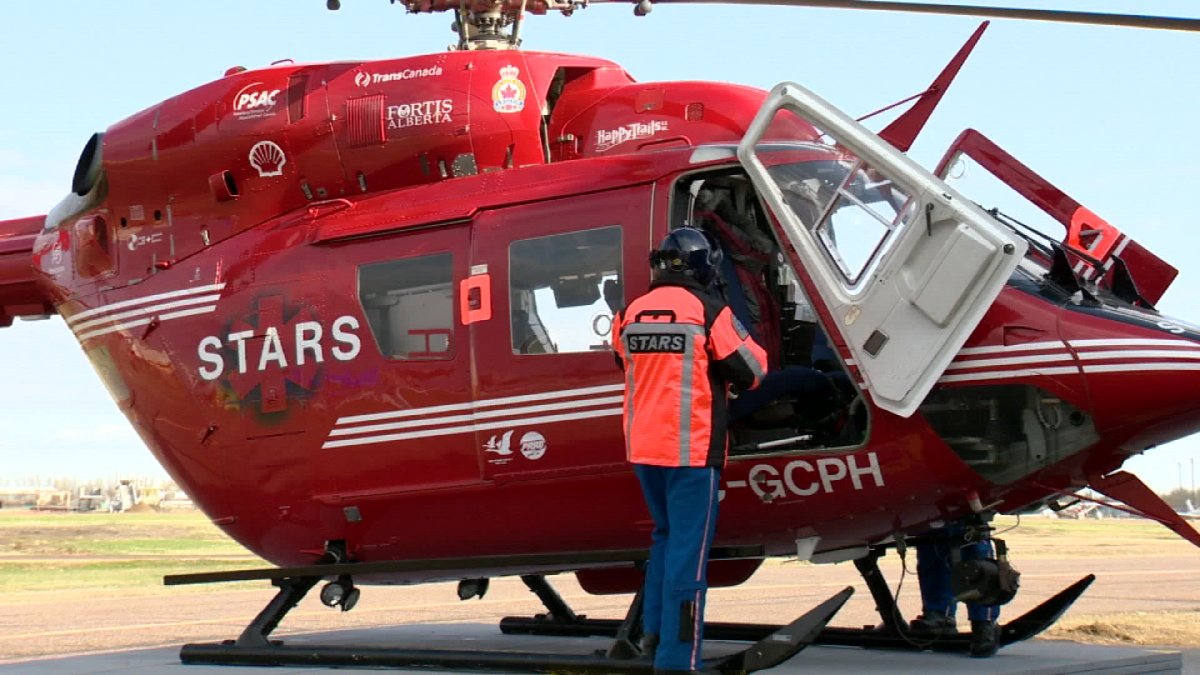WINNIPEG – The helicopter ambulance service known as STARS has been lauded in Alberta for decades as an essential life-saver, but has been criticized and even grounded in Manitoba over patient care concerns.

The reasons for the difference are far from clear as the non-profit agency is providing the same service in all three Prairie provinces.
“The helicopter, the staff, the training, the protocol are all identical,” said STARS spokesman Colin Fast.
The Manitoba government grounded STARS (Shock Trauma Air Rescue Service) in December for three months after three patients were thought to have been deprived of oxygen. One woman died in late November.
The government determined her death was due to an underlying medical condition. It allowed STARS to resume rescues under a new medical oversight committee, but still forbids the helicopter service from inter-hospital transfers, which are done by the government’s Lifeflight airplanes.
There are more than 500 critical cases each year in Manitoba — mostly in hospitals and personal care homes. The government took the step of grounding STARS based on the advice of medical experts, Health Minister Erin Selby has said.
The debate has become so polarized that Manitoba’s auditor general felt compelled to mention in a recent report that the service had been cleared by a review of several cases last year.
That review, by Manitoba’s medical director of ground ambulance service, found “no evidence of pervasive substandard patient care on the part of any STARS air medical crews.” It also said there were no deficiencies in reporting or quality assurance.
The finding stands in sharp contrast to a review of 10 cases a few months earlier by the medical director of air services, which said there was “evidence of serious patient concerns and infractions.”
Another review of 16 cases by Dr. Stephen Wheeler, B.C.’s medical director of air ambulance services, found STARS crews had exhibited “a lack of sophistication in dealing with airways and maintaining oxygenation.”
Wheeler said Manitoba’s STARS training program is too short and “cannot provide the necessary amount of training required for modern, complex, critical-care transports.”
In Alberta, where STARS has operated since 1985, there are no signs of such worries. The head of Alberta Health Services, which has managed the service since 2009, is quick with praise.
“STARS has provided uninterrupted service to the people of Alberta. We look forward to working with them to provide rapid, high-quality … care for Albertans for many years to come,” interim president Rick Trimp wrote in an email.
One key difference is that in Manitoba STARS is dispatched by a provincial medical transportation co-ordination centre, which handles rural and northern emergencies and patient transfers.
When an emergency call comes in, staff decide whether to send a ground ambulance, a LifeFlight airplane, a STARS helicopter or to respond in some other way. Alberta and Saskatchewan, where STARS has operated since 2012, have their own dispatch and communications centres.
STARS is rarely called in Manitoba, despite a $10-million-a year contract. It flew 177 missions last year compared with 821 in Saskatchewan and almost 1,700 in Alberta.
The Manitoba Government and General Employees Union has said in media interviews that STARS funding could be better spent on ground ambulances.
The low number of missions, combined with fixed costs for equipment and staff on standby, means the cost-per-flight for STARS has been high.
Auditor general Carol Bellringer chastised the NDP government for awarding STARS its contract in 2011 without letting other companies bid. She said each mission costs three times — or more — what it does in other provinces.
Bellringer acknowledges she accepted estimates from the Health Department and compared the STARS helicopter program with services such as Ornge in Ontario, which also operates less-expensive ground ambulances and planes.
The Manitoba government says it is working to get STARS back to full service, including inter-hospital transfers, in the near future.
STARS has agreed to work with the new oversight committee and to address training concerns. It hasn’t publicly criticized the province or questioned how it has been treated.
“We work together with government as our partner here in Manitoba and if they have a concern about patient care or any aspect of our program, that’s a conversation we want to have with them,” Fast said.



Comments